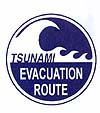LAND
USE/
LAND AREA |
DOS
AND DON'TS |
REASONS |
| Site
Disturbance, Yardwork, Clearing, Landscaping |
DO
keep site disturbance to a minimum, especially removal of natural vegetation
and exposure of bare soil. (Both Lincoln City and Lincoln County have site
development ordinances around Devils Lake.) |
Site
disturbance dramatically increases surface runoff and erosion contributes
phosphorus to lakes. |
| |
DO
seed and mulch bare soil within two weeks of clearing. |
Plants
trap sediments and the phosphorus they carry. |
| |
DO
leave naturally vegetated areas (buffer strips) along lake shores, streambeds,
road ditches, intermittent streams. Leave at least 25 feet of undisturbed
buffer, with more on poor soils or steep slopes. |
Buffer
strips intercept runoff and filter sediment and phosphorus from water before
it reaches the lake or stream. |
| |
DO
plant deep-rooted, woody vegetation along lake shores, streambeds, road
ditches. |
Plant
roots stabilize shoreline, prevent erosion, and take up nutrients carried
by water before they reach the lake. |
| |
DO
preserve natural topography and natural drainage systems. |
Natural
drainage systems evolve over years and effectively control sediment and
phosphorus. |
| |
DO
use fertilizer sparingly and in multiple applications. Hay mulch is preferable. |
Solid,
inorganic fertilizers are readily dissolved by water and transported in
runoff. |
| |
DON'T
use herbicides and pesticides in excess on your garden and lawn. Avoid their
use if possible. |
Many
of these products are toxic and can get into the water. |
| |
DON'T
put leaves, grass clippings, branches or any kind of organic matter into
the lake. |
Plant
debris adds phosphorus and other nutrients directly to the lake. |
| Shore
frontage |
DO
leave existing rocks in place along shore. |
|
| |
DO
minimize shoreline alteration, such as removal of vegetation, construction
of piers, breakwaters, etc. (Shoreline alteration requires a permit from
City, County and/or State.) |
Shorelines
are generally stable due to years of wind and wave action. Alteration of
the natural shoreline de-stabilizes the shoreline, increases erosion and
impairs fish and wildlife habitat. |
Tree
cutting,
Forestry |
DO
leave trees along the shoreline or streamfront. Consult laws before cutting,
harvesting limitations may apply. (Devils Lake Water Improvement District
requires a permit to harvest timber in the watershed.) |
Trees
and natural cover best protect against shoreline erosion and sedimentation
of lakes. Trees take years to grow and only minutes to cut down. |
| Septic
systems |
DO
check sludge level in septic tank every year. Pump when sludge fills half
of the tank (average is every 2-3 years for year-round residents. 5-6 years
for seasonal residents). |
Septic
systems must be maintained if they are to function properly. If settled
solids are not removed from the tank, they will wash into and clog the drainfield. |
| |
DO
conserve water, and give the septic system time to 'rest' after heavy use. |
The
less water you use, the better your septic system will work. |
| |
DON'T
flush strong cleaning agents (drain cleaner, bleach) into your septic system. |
Septic
tanks are living systems. Strong cleaners kill the microorganisms that break
down the waste. |
| |
DON'T
flush cigarette butts, paper towels, etc. down the toilet |
These
items fill up the septic tank quickly and cannot be broken down by microorganisms. |
| |
DON'T
install or use an in-sink garbage disposal. |
Ground
up garbage overburdens your septic tank and slows its functions. |
| |
DON'T
use commercial products that claim to clean your septic tank without pumping. |
These
products can cause clogging of your drainfield, and many contain chemicals
which can contaminate groundwater. |
| |
DON'T
put paint or chemicals into the septic system. |
These
hazardous products kill microorganisms in the septic tank, and contaminate
drinking and lakewater. |
| Car
wash |
DON'T
wash cars near lakes, streams, or drainage ditches. |
Runoff
should be diverted to vegetated surfaces and allowed to seep into the ground. |
| Surface
runoff from developed areas (driveways, roofs, lawns, etc.) |
DO
prevent water from running directly into lakes and streams. Detain in depressions
or divert flow to flat, wooded areas. |
Flowing
water carries sediment and phosphorus. Detaining or dispensing water allows
it to filter into the soil where sediment and phosphorus are filtered out. |
| Roads |
DO
plant vegetative buffer strips along roads and stabilize road ditches by
seeding or riprapping. |
Plants
slow runoff from roads and help to remove sediment and phosphorus before
they reach lakes or streams. |
| |
DON'T
allow water to run directly off roads into lakes or streams. |
Water
running off roads contains sediment, phosphorus, and pollutants from cars. |
| Structures
(houses, decks, sheds) |
DON'T
build close to the water. (City and County ordinances require a nutrient
barrier between Devils Lake and construction sites prior to land disturbance.) |
Shoreline
disturbance dramatically increases sedimentation of the lake. |
| Fill/dredge |
DON'T
fill or dredge unless necessary. Both activities require a permit from the
State Lands Division. |
Filling
and dredging stir up sediment and impair natural habitat. |
| Storage
of hazardous materials |
DO
store hazardous materials in a contained area. |
Containment
prevents contamination of water supplies and lake waters by undetected leaks. |
| |
DON'T
dispose of paint thinners or chemical products on the ground. |
These
products can contaminate groundwater and lakewater. |
